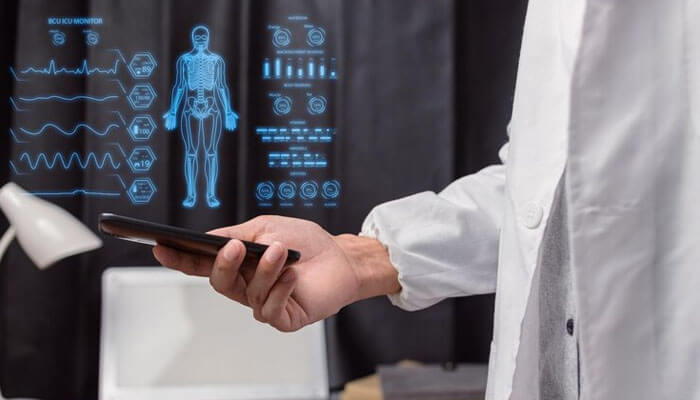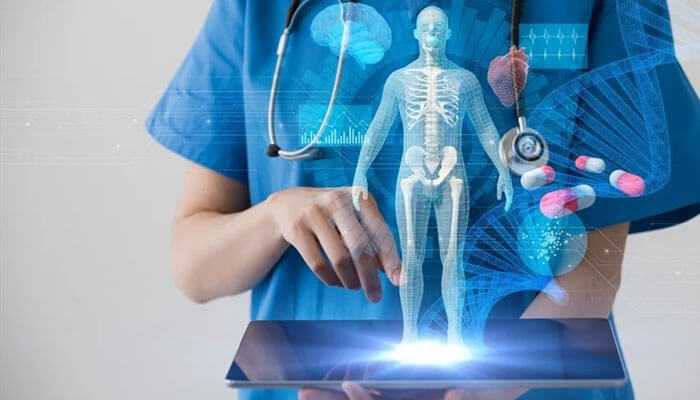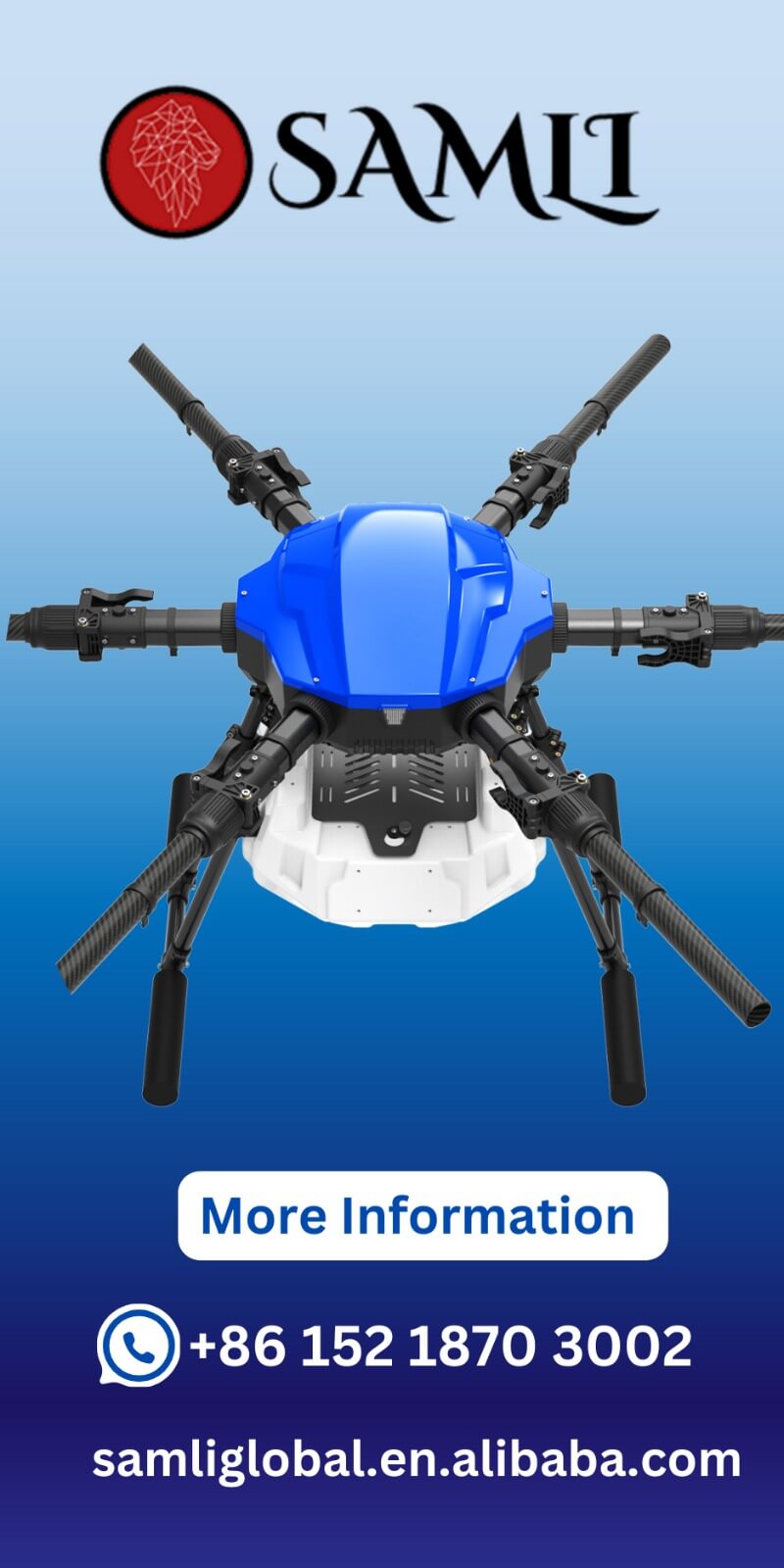IoT healthcare devices, also called IoMT solutions, are smart, unified tools fortified with built-in detectors and other techs that collect health data and transmit it through cloud computing. They monitor data such as blood pressure, heart rate, oxygen levels, and other vitals and can watch full or both doctor and patient for any changes that may need action. It is a true leap in chronic illness management, which provides a level of monitoring that was before impossible outside of the hospital.
Smart IoT devices go beyond tracking by offering functionalities such as administering medications, aiding in rehabilitation, and preemptively addressing health concerns, among others. They seamlessly integrate into broader healthcare systems, facilitating secure information exchange among patients, devices, and healthcare professionals. This interconnected system, comprising devices, software, protocols, data streams, and interfaces, creates an IoT framework ensuring organized communication within the ecosystem.
A recent market study by P&S Intelligence forecasts that IoT medical devices are anticipated to achieve a valuation of approximately USD 297.0 billion by the year 2030.
Global Health Challenges: Chronic Diseases and Aging Population
The rate of chronic conditions like diabetes, hypertension, chronic obstructive respiratory diseases (COPD), asthma, and cardiovascular disease is on the rise worldwide now. Besides the continuing processes of the aging population and the ongoing growth of the world’s population, this trend, however, is also fuelled by various factors.
Specially, in these countries, the fast-growing older population and the shortage of proper primary healthcare facilities are fuelling the application of remote patient monitoring techniques and investments for the expansion of hospitals. According to the forecast by WHO, the world’s population who have reached 60 years or more will comprise as much as 2.1 billion by the year 2050.
Benefits of IoT Healthcare Devices
IoT healthcare devices offer a wealth of advantages that significantly enhance patient care across various aspects of healthcare delivery. By harnessing IoT applications and analyzing the data they generate, healthcare providers can gain valuable insights, leading to improved outcomes and operational efficiency. Here are the key benefits:
Reduced Need for Frequent Doctor Visits:
IoT technology enables virtual appointments and remote patient monitoring, reducing the necessity for patients to visit healthcare facilities frequently. This shift promotes convenience and accessibility for patients while optimizing healthcare resource utilization.
Enhanced Treatment and Diagnostics:
Remote patient monitoring tools, coupled with smart IoT sensors, deliver crucial medical data directly to healthcare providers. This data-driven approach strengthens treatment and diagnostic capabilities, facilitating quicker and more accurate diagnoses, and leading to effective treatment plans.
Optimized Drug and Equipment Management:
IoT solutions streamline drug administration and equipment usage. By ensuring the right medication administration, maintaining optimal environmental conditions, and enhancing equipment utilization, healthcare facilities can save time, reduce errors, and improve patient care outcomes.
Cost Savings and Operational Efficiency:
The implementation of IoT healthcare devices reduces manual work, streamlines processes, and optimizes workforce management. For instance, patient monitoring devices enhance nursing efficiency, allowing for more effective patient care while minimizing staffing costs.
Early Diagnosis and Emergency Prevention:
IoT systems are instrumental in early disease detection, allowing for proactive intervention and prevention of costly emergencies such as equipment breakdowns. These systems contribute to improved patient safety and overall healthcare service reliability.
Types of IoT Healthcare Devices
Fitness Trackers:
These devices monitor physical activity, steps, pulse rate, and sleep patterns, aiding in personal well-being management.
Heart Rate Monitors:
Designed to spot and monitor heart rhythm and pulse, these devices are beneficial for athletes, managing heart illnesses, and promoting general heart health.
Smart Glasses:
Integrating digital and physical realms, smart glasses provide real-time data overlays to support medical professionals and aid individuals with visual impairments.
Wearable ECG Monitors:
Essential for patients with heart conditions, these devices provide electrocardiograms to detect abnormal heart rhythms.
Implantable Devices:
Including smart pacemakers for regulating heart rhythms, biochips for real-time health data retrieval, and glucose monitoring implants for diabetes management.
In-Hospital Devices:
Such as connected inhalers for respiratory disease management, bed sensors for patient monitoring, and smart IV pumps for precise medication delivery.
Smart Clothing:
Featuring sensor-embedded fabrics that track vital signs, adjust the temperature, and provide GPS tracking, enhancing worker well-being and machinery operation efficiency.
Augmented Reality in Daily Life
AR glasses and wearables are becoming indispensable tools, revolutionizing navigation, learning experiences, and professional tasks. For instance, maintenance professionals can access information hands-free through voice commands or QR codes, boosting productivity and safety in workplaces.
Enhanced Productivity for Maintenance Professionals
Wearable tech transforms how maintenance professionals work by providing real-time access to vital information, speeding up processes, reducing errors, and ensuring safer workplaces.
Remote Expert Assistance
Wearables enable remote experts to offer live guidance to on-site technicians, reducing downtime and physical travel needs.
Safety Protocols
Wearable devices contribute to enhanced safety by providing real-time alerts, particularly in hazardous environments, ensuring worker well-being and risk reduction.
Smart Environmental Monitoring
IoT-enabled systems automatically adjust environmental parameters like air quality and temperature, crucial for maintaining safe conditions in critical healthcare areas.
Future Of IoT Healthcare Devices
IoT healthcare devices have a very promising future ahead of them as they incorporate such developments as AI-based diagnosis and sophisticated remote patient monitoring, while wearable health-monitoring devices continue to gain popularity. Advancements in interoperability standards will facilitate the smooth integration of health data, while the addition of telemedicine to the array of services will lead to increasing the potential of remote care provision.
The Importance of cybersecurity will be critical together with the IoMT system rise shifts the basis of healthcare as personalized medicine and various healthcare delivery models are introduced. Issues of ethics, as well as, regulations will provide us with a guide to the responsible use of the robots. In general, the Internet of Things (IoT) devices will lead healthcare to revolution, the availability of patients’ utility, and operational efficiency with a more personalized, integrated, and secure approach.
Partnership, Mergers & Acquisitions Are Foremost Trends
In January 2023, Cognizant Technology Solutions Corporation finalized the acquisition of Mobica, a provider of IoT software engineering services. This move was aimed at bolstering Cognizant’s range of offerings in IoT software engineering.
The future of IoT healthcare devices is promising with AI-based diagnostics, remote patient monitoring, and the rising popularity of wearable health tech. Enhanced interoperability and telemedicine integration will expand remote care options. Cybersecurity and ethical considerations will guide responsible use as IoT transforms healthcare toward personalized, secure, and efficient services.



